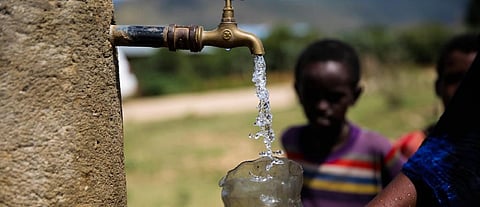COVID-19: Ethiopia stares at water crisis
The novel coronavirus disease (COVID-19) pandemic continues to have a firm grip on the world and it is getting progressively clear that people with minimum access to essential services such as water will be on the receiving end.
African countries such as Ethiopia have been facing water shortage, poor sanitation and lack of access to clean water sources for long. At least 60-80 per cent of communicable diseases are attributed to limited access to safe water and inadequate sanitation and hygiene services.
Only 42 per cent of the population has access to clean water and only 11 per cent of that number has access to adequate sanitation services in Ethiopia, according to a study conducted by Water.org. In rural areas of the country, these figures are even lower — as a result, health problems are common among villagers and their livestock.
|
Source: Charity Water Ethiopia
According to another study conducted by an organisation, one-third of the population there did not have access to safe water. About 31 per cent of Ethiopian population (32 million) relied on unsafe water for their daily needs, according to the Joint Monitoring Programme (JMP), a global database of water, sanitation and hygiene data.
Another 28 per cent had limited access; meaning the water was likely safe, but it took over 30 minutes to retrieve it because of distance to the source, overcrowding there or both. More than 62 million people live without basic access to safe drinking water in Ethiopia.
In fact, Ethiopia alone accounts for 7.5 per cent of the global water crisis.
The basic act of washing hands, needed particularly to keep the virus SARS-CoV-2 at bay, is challenging in several developing countries like Ethiopia. According to the JMP data, 41 per cent of households have no hand-washing facility at all.
About 51 per cent have the facility, but no reliable source of clean water or soap. The remaining 8 percent have ‘basic’ access, meaning they have access to a facility with soap and water.
This makes maintaining healthy hygiene and sanitation is difficult for most communities in Ethiopia.
Ethiopia is home to many major rivers amongst sub-Saharan African countries with a likely average of 1,575 cubic metre of available water resources per capital per year. Though plenty of water is available in the country, only 3 per cent of water resources can be accessible.
The demand for drinking water in rural areas is mostly fulfilled using groundwater through shallow wells, deep wells and spring wells. Those who have no access to water supply, usually obtain water from rivers, unprotected springs and hand-dug wells. To add to their woes, several rivers there are highly polluted which makes it unfit for drinking, handwashing and other household purpose.
The main reason for river or surface water pollution in Ethiopia is fast population growth, uncontrolled urbanisation and industrialisation and poor waste management practices. The rivers in Addis Ababa, including the big and the small Akaki, are simply used as a receptacle of all kinds of wastes released in the city.
Addis Abba holds about 65 per cent (more than 2,000) industries of the country and most of them are located along river banks. More than 90 per cent of these industries do not have any kind of treatment facilities and therefore, they discharge their solid and liquid waste into nearby rivers or stream.
The biota of most of these rivers has been destroyed. Further, most research studies show that the river water quality is so bad, it is not even fit for irrigation and livestock washing.
Ethiopia is also highly prone to drought. Clean water is the most basic need to combat water-borne diseases, particularly COVID-19. Clean water is also vital in fight against future pandemics.


